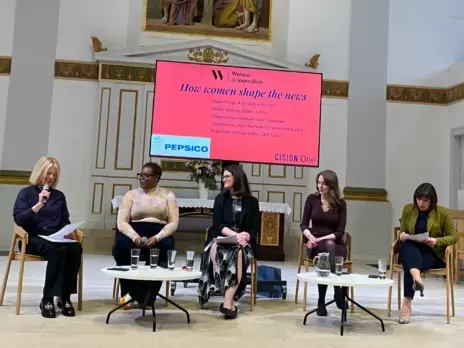
From the outside, it may appear that advertising is now insignificant for the New York Times when compared with its soaring digital subscriptions business.
But while the company’s 6m-plus paying online reader figures rightly attract attention (it is the runaway leader of Press Gazette’s 100k Club ranking), advertising remains a large part of its business.
In 2019, $531m (or 29%) of the NYT’s revenues came from advertising. This figure is likely to have taken a sizeable hit at the hands of Covid-19 in 2020, but chief executive Meredith Kopit Levien recently told investors that advertising remains a “very important part” of her plans.
For the Times, as well as for other publishers, the future size and significance of digital advertising could be defined over the next year.
Not only will the longer-term effects of Covid-19 start to become apparent, but the digital publishing industry will have to contend with the continued phasing out – and eventual death – of third-party cookies.
Today, for the latest edition of Press Gazette’s new Marketing Matters newsletter, we speak to Pranay Prabhat, senior director overseeing digital ads engineering at the New York Times, about the challenges of 2021 – which he describes as “the most important year” of his time in the job – and his team’s new first-party data advertising programme.
[Click here to sign up for Press Gazette’s fortnightly Marketing Matters newsletter]
New first-party data programme
One of the advantages of having 6m digital subscribers, and a website that attracts many millions more web browsers, is that the New York Times holds a large amount of information (or first-party data) about its readers.
As well as knowing what content users are interested in (based on their reading habits on the NYT website and apps), tens of thousands of readers have volunteered to participate in surveys to help improve the publisher’s advertising.
What does it do with this information? In June last year, the company launched a new first-party data programme for its direct-sold ads business.
Traditionally, digital publishers have relied on external data management platforms (DMPs) to help them target audiences through direct-sold ads.
But because DMPs generally use third-party cookies – which are on the verge of extinction thanks to new privacy laws across the world (e.g. GDPR in Europe) and crackdowns by Apple and Google – the NYT set out in 2019 to develop its alternative, in-house first-party programme.
Seven months after launch, the programme is producing promising results. In a recent blog on the NYT’s website, Prabhat said his team of around a dozen had found “ad campaigns targeted on the first-party data perform equally well as campaigns targeted on third-party data”.
He explained to Press Gazette: “We had campaigns running on our previous audience-targeting capabilities, which had third-party data involved. Obviously, there was no first-party capability at that time.
“And then we are running campaigns with this new concept of machine-learning, which we have built. We were just comparing the campaigns that way.
“There was a lot of A/B testing we did with our clients to see how those campaigns performed. And that’s when we realised that some of the signals we are looking for are actually pretty much comparable. In fact, sometimes it’s better than what we used to have.”
[Read more: How Jeff Bezos’ Washington Post is taking on Google and Facebook with ‘insanely unique’ ad technology for publishers]
Publishers worry about the loss of third-party cookie revenues
For Prabhat, the death of third-party cookies – which will lead to enhanced privacy protections for web browsers – is “a good thing”.
But he also acknowledges that the change introduces a major challenge for the publishing industry, and that the NYT is not exempt from this.
“It’s a very, very complicated situation right now,” he says. “I think the worry I have is, with third-party cookies going away… are there good enough alternatives for our marketers to be able to reach the right audiences versus what they’re able to do on Google and Facebook?
“And that is a worry for all publishers – whether small, big, it’s just a fact. How do you provide the best possible capabilities to the marketers with the third-party cookies going away?
“Now what we’ve done [with the new data programme] is probably a decent answer. I’ll not say this is a great answer for everything. Our solution is a decent answer to our direct-sold marketers – because our project was mostly for our direct-sold business.”
But there remain question marks over the future of programmatic (not direct-sold) advertising for the NYT, as well as for other publishers.
Prabhat adds: “I think 2021 is the year we want to invest very, very deeply into what we’re going to do with programmatic going forward. So I will say that it’s not just other publishers. We are equally concerned about what to do and how to recoup the dollars which can be lost by third-party cookies going away.”‘
‘This is the most critical year from an advertising perspective’
Google and Facebook’s dominance of the digital advertising market is a long-running concern for all publishers. Does Prabhat fear that the end of third-party cookies, and the subsequent disruption for publishers, could enable the tech giants to grow their dominance using the troves of data they possess?
“I would not say that there is a fear,” he says. “I would say that this is a good opportunity for us to be proactive and more innovative in how we plan our ads business.
“I think this is like a turning point, a pivotal point in the industry.
“Big tech has their own opportunity to be able to do good stuff. But it’s a chance for the open web to come up with a very good and powerful strategy to be able to attract the marketers going forward, without the third-party cookies.
“So I don’t know whether it’s fear. I just think that it’s very, very important for all of us to super clear about what the industry’s looking like right now, in what direction it’s going, what technologies make sense and don’t make sense – and apply those, and start testing what works and what doesn’t.”
Prabhat describes 2021 as “the most important year – I have been working with the Times for quite some time and I feel like this is the most critical year from an advertising perspective”.
He adds: “This is an opportunity for everybody on the open web to come up with a good solution – a more long-term solution, a more comparable solution – which brings everyone to a level playing field. And if we don’t do it in the next two years, I think that opportunity will not come again in the next ten years, 15 years.”
Email pged@pressgazette.co.uk to point out mistakes, provide story tips or send in a letter for publication on our "Letters Page" blog






